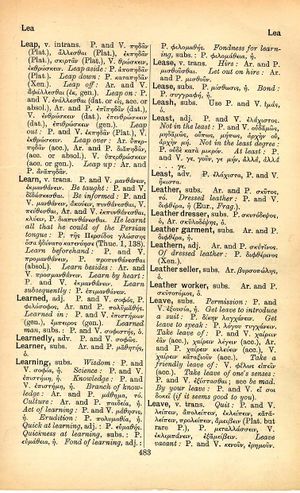leave
Οὔτ' ἐν φθιμένοις οὔτ' ἐν ζωοῖσιν ἀριθμουμένη, χωρὶς δή τινα τῶνδ' ἔχουσα μοῖραν → Neither among the dead nor the living do I count myself, having a lot apart from these
{{Woodhouse1
|Text=
substantive
permission: P. and V. ἐξουσία, ἡ.
get leave to introduce a suit: P. δίκην λαγχάνειν.
get leave to speak: P. λόγου τυγχάνειν.
take leave of: P. and V. χαίρω ἐᾶν, χαίρειν ἐᾶν (acc.), χαίρω λέγειν, χαίρειν λέγειν (acc.), Eur., Electra 609).
bequeath: Ar. and P. καταλείπω, καταλείπειν, V. λείπω, λείπειν (Eur., Alcibiades 688).
leave alone, let be: P. and V. ἐᾶν.
leave behind: Ar. and B. ὑπολείπειν.
be left behind (in a contest): P. and V. λείπεσθαι, V. ἐλλείπεσθαι, [[Aristophanes |χαίρειν]] καταξιοῦν (acc.). Take a friendly leave of: V. φίλως εἰπεῖν (acc.). Take leave of one's senses: P. and V. ἐξίστασθαι; see be mad. By your leave: P. and V. εἴ σοι δοκεῖ (if it seems good to you). v. trans. Quit: P. and V. Ar. and P. ὑπολείπεσθαι.
leave for decision: see leave to.
leave go of: P. and V. μεθιέναι (acc.), ἀφιέναι (acc.), ἀφίεσθαι (gen.), Ar. and V. μεθίεσθαι (gen.).
leave in (a place): P. ἐγκαταλείπειν (absol.).
leave in the lurch: P. and V. λείπω, λείπειν, καταλείπω, καταλείπειν, προλείπω, προλείπειν, προδιδόναι, ἐρημοῦν, Ar. and P. προϊέναι (or mid.).
leave off: verb transitive, P. and V. μεθιέναι; verb intransitive, see cease.
leave out: P. and V. παραλείπειν (Eur., Helen 773), παριέναι, ἐκλείπω, ἐκλείπειν, ἐλλείπειν.
be left over: [[Aristophanes |προλείπειν]], ἀμείβειν (Plat. but rare P.), P. μεταλλάσσειν, V. ἐκλιμπάνειν, ἐξαμείβειν. Leave vacant: P. and V. κενοῦν, ἐρημοῦν. You have left no hope among us: V. οὐδʼ ἐλλέλοιπας ἐλπίδα (Eur., El. 609). Bequeath: Ar. and P. Ar. and V. περιλείπεσθαι; see remain.
leave to (for decision, etc.): [[Aristophanes |λείπειν]] (Eur., Alc. 688). Leave alone, let be: P. and V. ἐᾶν. Leave behind: Ar. and B. ὑπολείπειν. Be left behind (in a contest): P. and V. λείπεσθαι, V. ἐλλείπεσθαι, Ar. and P. ὑπολείπεσθαι. Leave for decision: see leave to. Leave go of: P. and V. μεθιέναι (acc.), ἀφιέναι (acc.), ἀφίεσθαι (gen.), Ar. and V. μεθίεσθαι (gen.). Leave in (a place): P. ἐγκαταλείπειν (absol.). Leave in the lurch: P. and V. Ar. and P. ἐπιτρέπω, ἐπιτρέπειν (τί τινι), V. παριέναι (τί τινι); see refer.|καταλείπειν]], [[προλείπω |προλείπειν]], προδιδόναι, ἐρημοῦν, Ar. and P. προϊέναι (or mid.). Leave off: v. trans., P. and V. μεθιέναι; v. intrans., see cease. Leave out: P. and V. παραλείπειν (Eur., Hel. 773), παριέναι, [[ἐκλείπω |ἐκλείπειν]], ἐλλείπειν. Be left over: Ar. and V. περιλείπεσθαι; see remain. Leave to (for decision, etc.): Ar. and P. ἐπιτρέπειν (τί τινι), V. παριέναι (τί τινι); see refer. |Ar.]] and P. χαίρω κελεύειν, χαίρειν κελεύειν (acc.), V. χαίρω καταξιοῦν, χαίρειν καταξιοῦν (acc.).
take a friendly leave of: V. φίλως εἰπεῖν (acc.).
take leave of one's senses: P. and V. ἐξίστασθαι; see be mad.
by your leave: P. and V. εἴ σοι δοκεῖ (if it seems good to you).===verb transitive===
quit: P. and V. λείπω, λείπειν, ἀπολείπω, ἀπολείπειν, ἐκλείπω, ἐκλείπειν, καταλείπω, καταλείπειν, προλείπω, προλείπειν, ἀμείβειν (Plato but rare P.), P. μεταλλάσσειν, V. ἐκλιμπάνειν, ἐξαμείβειν.
leave vacant: P. and V. κενοῦν, ἐρημοῦν.
you have left no hope among us: V. οὐδ' ἐλλέλοιπας ἐλπίδα ([[Euripides }}

